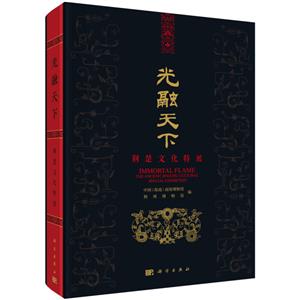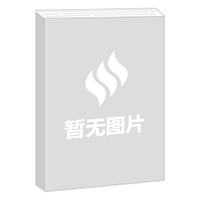-
>
清通鑒(全四冊)(精裝)
-
>
明通鑒(全三冊)(精裝)
-
>
跨太平洋的華人改良與革命 1898-1918
-
>
天有二日(簽名鈐印特裝本)
-
>
歐洲至暗時刻(1878-1923):一戰為何爆發及戰后如何重建
-
>
(精裝)奧托·馮· 俾斯麥與德意志帝國建立
-
>
華文全球史:中國文脈
光融天下:荊楚文化特展:the ancient jingchu cultural special exhibition 版權信息
- ISBN:9787030702333
- 條形碼:9787030702333 ; 978-7-03-070233-3
- 裝幀:一般膠版紙
- 冊數:暫無
- 重量:暫無
- 所屬分類:>>
光融天下:荊楚文化特展:the ancient jingchu cultural special exhibition 本書特色
適讀人群 :考古、歷史、博物館、藝術等方向研究者和愛好者,大專院校相關專業師生收錄了來自荊州博物館的200余件楚文化珍貴文物,反映了楚文化自新石器時代至秦漢時期的整體風貌及其發展概況。
光融天下:荊楚文化特展:the ancient jingchu cultural special exhibition 內容簡介
《光融天下:荊楚文化特展》是2021年9月至11月在中國(海南)南海博物館舉辦的“光融天下——荊楚文化特展”的配套圖錄,收錄了來自荊州博物館的200余件楚文化珍貴文物,反映了楚文化自新石器時代至秦漢時期的整體風貌及其發展概況,以戰國楚文化鼎盛時期的青銅器、玉器、漆器、絲織品等物質文化遺存為重點,種類豐富、器形多樣、紋飾精美,充分體現了楚文化的藝術風格和水平。《光融天下:荊楚文化特展》圖文并茂,圖片精美,資料豐富,可作為了解、研究楚文化的一本參考資料書。
光融天下:荊楚文化特展:the ancient jingchu cultural special exhibition 目錄
前言 1
**單元 篳路藍縷
楚之先祖 6
居國南鄉 14
辟在荊山 24
第二單元 宅茲江漢
鐘鳴鼎食 40
堅甲利兵 80
荊山美玉 102
丹漆流韻 150
束帶矜莊 170
第三單元 朝宗于海
祚衰南土 200
四海承風 206
結語 232
“光融天下——荊楚文化特展”展覽解析/李東風 234
“光融天下——荊楚文化特展”內容策劃的探討/康茜 239
楚式玉雕中的象生造型/張緒球 246
楚人尚鐘——簡述荊州天星觀2號墓出土的編鐘/田勇 張萬高 262
丹漆神韻——驚采絕艷的楚漆器/院文清 267
楚都紀南城和紀南城的楚貴族/楊理勝 282
后記 289
光融天下:荊楚文化特展:the ancient jingchu cultural special exhibition 節選
前言 從西周成王(約公元前1055 年—前1025 年)始封楚起至秦始皇滅楚(公元前223 年)、統一中國止的八百余年間,楚國由小到大,由弱變強,由興盛到衰亡,楚人創造的文化也隨之不斷發生變化。楚文化璀璨奪目,博大精深,老莊哲學、神話傳說、屈宋辭賦,以及楚文物中所反映出的令人嘆為觀止的藝術成就,如精巧繁縟的青銅禮樂器,精彩絕倫的玉器,瑰麗奇譎的漆木器,巧奪天工的絲織品無一不體現出楚人進取、奮斗的精神和原始、質樸的民風。秦漢時期,楚文化進一步與中原文化融合,成為中華文化的重要組成部分。 2020 年初,新冠肺炎疫情肆虐荊楚大地,海南醫療隊馳援荊州,共抗疫情,荊州與海南兩地結下了深厚的情誼。為加深兩地之間的文化交流合作,弘揚偉大的抗疫精神,傳承中華優秀傳統文化,豐富人民群眾精神文化生活,中國(海南)南海博物館與荊州博物館密切合作,共同舉辦本次展覽。展覽通過199 件(套)荊州博物館典藏菁華,展現楚國從立國、崛起、興盛、衰亡,并融入大一統漢文化之中這一歷史過程。展覽深入挖掘和闡發楚文物蘊含的歷史文化價值和時代價值,著重表現楚人“篳路藍縷”的艱苦奮斗精神、“撫夷屬夏”的開放包容精神、“上下求索”的銳意進取精神、“深固難徙”的愛國主義精神,展示中華文化的獨特魅力。 Preface The State of Chu, was enfeoffed under the rule of King Cheng of the Western Zhoudynasty, till vanquished by Emperor Qinshihuang, exists more than 800 years. During this time,Chu developed from a tiny vassal state, gradually gained strength, to one of the most powerfulstates of the Warring States period, until beaten by Qinshihuang who united the whole of China.The brilliant and comprehensive Chu culture is a wonderful flower flourishing on the fieldof history of human civilization. The enterprising spirit, unadorned custom, and fantastic artachievement of Chu people are embodied in the philosophy of Laozi and Zhuangzi, their myths,folk tales, poetry and ode, even the delicate bronze ritual instrument and exquisite lacquerware.During Qin to Han dynasty, Chu culture further merged with the culture of the central plains andbecame a significant constituent of Chinese culture. At the beginning of the year 2020, the new Coronavirus Pneumonia epidemic raged acrossthe land of Hubei province, the territory of ancient Jingchu culture. Hainan medical teammembers rushed to help Jingzhou to fight the epidemic together and forged a deep friendshipbetween Jingzhou and Hainan. In order to deepen cultural exchange and cooperation betweenthe two places, further develop the great anti-epidemic spirit, carry forward outstanding Chinesetraditional culture, and enrich people’s cultural-ethical life, the China (Hainan) Museum ofthe South China Sea collaborates with the Jingzhou Museum to organize this exhibition. Thisexhibition by displaying 199 pieces (sets) selected collection from Jingzhou Museum unfolds thehistorical process of the establishment, development, prosperity, decline, and fall of the Chu stateand its integration into the unified Han culture. Digging and illustrating the venerated historicaland cultural value implied in the Chu culture is the desired target to be achieved of curating thisexhibition. Moreover, the exhibition emphasized the hardworking spirit, inclusiveness, enterprise,and patriotism of Chu people to show the unique charisma of Chinese culture. 根據先秦典籍和古文字資料記載,楚人自稱“帝(顓頊)高陽之苗裔”。尊老童、祝融、鬻熊等為“楚先”。殷商末年,由首領鬻熊率領,投附周人。周成王時, 封鬻熊之后熊繹于楚蠻之地,“號為子男五十里”,成為西周王朝體系中的一個小國。周昭王時,楚、周關系已日益疏遠。楚人為擺脫周人的壓力, 逐漸南徙,謀求獨立發展。熊渠在位時,曾一度強大稱王,但隨后又因內亂而衰落。至春秋早期,楚國迅速崛起,陸續征服了江漢一帶的眾多鄰邦,漸成為地廣千里的南方大國。 According to the record of ancient texts, Chu people believethey are the progeny of Zhuanxu, a legendary monarch in ancientChina. Laotong, Zhurong, Yuxiong (descendants of Zhuanxu) areall their ancestors. In the late Shang dynasty, the chieftain Yuxiongled the tribe to go and live as a dependent to Zhou (a vassalkingdom of the Shang dynasty). After Zhou replaced the Shang,under the rule of King Cheng of Zhou, Xiongyi the offspring ofYuxiong was enfeoffed in the land of Chu, then became the Stateof Chu, a vassal state of the Western Zhou dynasty. However,the relationship between Chu and Zhou was growing alienatedin the middle of the Western Zhou dynasty. In a bid to get rid ofrestrictions from the central authority and seeking for independentdevelopment, Chu people gradually migrate southward. Duringthe reign of Xiongqu, it became a considerable power amongvassal states, then start to fade due to civil strife. Until theEarly Spring and Autumn period, Chu rose sharply again andcontinuously conquered a number of neighboring states aroundthe Jianghan area. Finally, gained large tracts of land, thenattained prosperity in southern China. **單元 PartⅠ Rise From Arduous Environment 篳路藍縷 楚文化是楚人在繼承中原文化的基礎上,融合了江漢地區土著文化而形成的一種區域文化。楚人的起源,主要有“北來說”和“土著說”兩種觀點,學術界尚未取得一致意見。“北來說”認為楚人來自北方中原地區,后來南遷至江漢地區。“土著說”則認為楚人起源于江漢地區的本地土著。目前,“北來說”的觀點占據主流,《史記》等文獻認為楚人為祝融之后,屬于華夏族,而且近年新出土的楚簡資料也支持楚人起源于中原的觀點。 楚之先祖 荊字陶罐 新石器時代石家河文化 口徑10、高13.6厘米 出土編號:鄧家灣T3M32∶6 1987~1992年湖北天門鄧家灣遺址出土高領,長直頸,溜肩,鼓腹。陶文刻于陶罐肩部,左邊作“井”字形,右邊作一豎畫,外有一不規則圓圈。該陶文與西周金文“荊”字字形相似,是探索先楚文化的重要資料之一。
- >
名家帶你讀魯迅:故事新編
- >
自卑與超越
- >
羅曼·羅蘭讀書隨筆-精裝
- >
上帝之肋:男人的真實旅程
- >
有舍有得是人生
- >
中國人在烏蘇里邊疆區:歷史與人類學概述
- >
唐代進士錄
- >
詩經-先民的歌唱


















